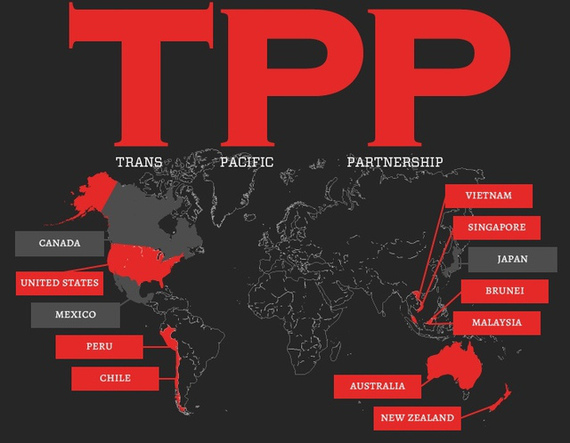While the Trans-Pacific Partnership deal is being hotly debated in Congress, the fact is that this trade deal -- or any trade deal -- will have little impact on American jobs, or more specifically, on the decline in good-paying jobs for middle-class Americans.
In the 1990s, after the passage of NAFTA, companies based in the United States added 4.4 million jobs. In the first decade of the twenty-first century, they eliminated nearly 3 million -- mostly as a result of globalization and rapid technological change. Median family income in the U.S. fell six percent in the past decade, and average net worth of middle-class families has declined by 30 percent.
The United States is not alone in terms of economic decline. Other Western and developed countries have had a low per capita growth rate of under one percent, about one-third of the rate in the 1950s and '60s. At the same time, developing nations, including China, India, Brazil and Russia, have experienced growth rates often in the double-digits.
What does this say about the future of American jobs and the American middle-class? With the dual threat of globalization moving more and more jobs to low-wage countries and the rapid technological downsizing of the labor force, the future is bleak for decent paying jobs in America, whether or not we have favorable trade deals.
Politicians, business people and labor organization who promise the return of middle-class jobs to the U.S. are certainly fooling themselves, if not the general public. Even a rebound in corporate profits after the Great Recession has done little to restore middle-class prosperity, primarily because in a globalized and technologically advanced world, profits don't translate into jobs.
There is now a historical disconnect as productivity increases while wages and the number of jobs stagnate. Western capitalism -- and advanced democracies -- are simply not equipped to deal with a world in which low-wage labor markets and rapid technological change reduce labor to a commodity that is increasingly plunging in value. If the U.S. and other nations do nothing to address the growing loss of labor value, then the wealth gap and threat of political instability will grow substantially.
What is ironic is that most countries -- most especially the United States -- have many important tasks that are crying out for workers to perform those tasks. Everything from infrastructure to education and health are in desperate need of attention and America has a vibrant and energetic workforce that is well equipped to step up. The only problem is that no one, certainly not in the private sector, will pay workers decent salaries to perform those important tasks.
The only institution in a capitalist society that is truly capable of investing in infrastructure, education, health and other tasks that benefit society is the government. During the depths of the Depression, the federal government invested heavily in works programs like the WPA which changed the landscape of America and gave dignity and purpose to the unemployed.
Today, our challenge is even greater than during the Depression, since middle-class jobs are rapidly disappearing and unlikely to come back anytime soon. It is the challenge for our government to find a way to provide meaningful work to millions of citizens and at the same time grow our economy to pay for it.
While this may sound like socialism to some, there is simply no other way to restore the economic, social and political health of our nation. The alternative, as the economist Larry Summers -- no wild-eyed socialist -- predicted, is a "Downton Abbey" economy, in which the vast majority of Americans are employed at low wages to serve the whims of a tiny elite living in luxury. Not a future that any of us want for our children.

